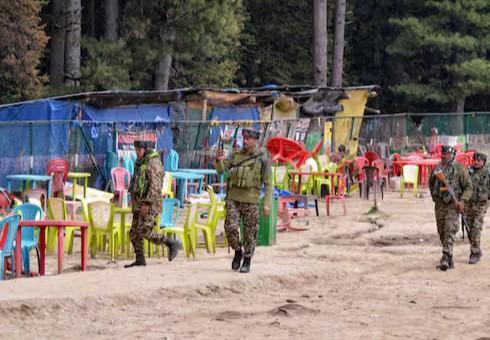
Terrorists hiding in J&K told to block roads if war erupts, damage policemen’s homes: Report
The volatile situation between India and Pakistan has taken a new turn with reports emerging that terrorist outfits Jaish-e-Mohammed (JeM) and Lashkar-e-Taiba (LeT) have instructed their members hiding in Jammu and Kashmir to be on high alert and take drastic measures if a war breaks out between the two nations. According to a CNN-News18 report, citing intelligence sources, the terrorists have been asked to block highways and damage police personnel’s homes.
This alarming development comes at a time when tensions between India and Pakistan are running high, with both countries engaged in a bitter war of words over the abrogation of Article 370 and the subsequent lockdown in Kashmir. The situation has been further exacerbated by the recent escalation of violence along the Line of Control (LoC), with both sides exchanging heavy gunfire and mortar bombs.
The report by CNN-News18, citing intelligence sources, reveals that JeM and LeT have issued instructions to their cadres hiding in Jammu and Kashmir to be prepared to take drastic action if a war breaks out. The terrorists have been told to block highways and disrupt the movement of people and goods, in an effort to create chaos and panic. Additionally, the outfit has instructed its members to damage police personnel’s homes, in a bid to avenge the destruction of their own homes during the Pahalgam terror attack.
The Pahalgam terror attack, which took place in July, was a brutal assault on a civilian bus carrying pilgrims to the Amarnath shrine. The attack, which was carried out by JeM terrorists, left 40 pilgrims dead and many more injured. In the aftermath of the attack, the Indian government had launched a massive operation to track down and neutralize the terrorists responsible for the attack, leading to the destruction of several terrorist hideouts and the killing of many militants.
The threat to block highways and disrupt the movement of people and goods is a serious concern, as it could have far-reaching consequences for the people of Jammu and Kashmir. The region is already under a strict lockdown, with all communication networks and internet services suspended. The blocking of highways would further exacerbate the situation, leaving people stranded and without access to essential supplies.
Moreover, the threat to damage police personnel’s homes is a stark reminder of the brutal tactics employed by terrorist outfits. The police personnel who have been tasked with maintaining law and order in the region are already vulnerable targets, and the threat to their homes would only serve to increase the sense of fear and uncertainty.
The development has raised concerns about the potential for a full-blown conflict between India and Pakistan, as well as the impact it could have on the people of Jammu and Kashmir. The region has already suffered greatly as a result of the ongoing Kashmir dispute, with thousands of people killed and many more displaced.
The Indian government has been urging Pakistan to take concrete steps to dismantle terrorist infrastructure and prevent the use of its soil for anti-India activities. However, Pakistan has consistently denied any involvement in the Kashmir dispute, and has instead accused India of human rights violations and aggression.
In light of the recent reports, it is clear that the situation on the India-Pakistan border remains volatile and precarious. The Indian government must take all necessary measures to ensure the safety and security of its citizens, while also engaging with Pakistan to find a peaceful solution to the Kashmir dispute.
In conclusion, the reports of terrorists hiding in Jammu and Kashmir being instructed to block roads and damage police personnel’s homes are a serious concern, and highlight the need for urgent action to address the situation. The Indian government must take all necessary measures to ensure the safety and security of its citizens, while also engaging with Pakistan to find a peaceful solution to the Kashmir dispute.



